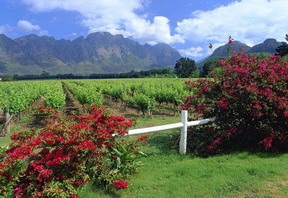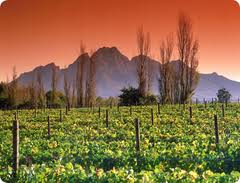History
and Heritage of the people of Franschhoek by AlterSage
top
- Franschhoek Bed & Breakfasts - Franschhoek
Accommodation
Franschhoek is a beautiful,
scenic valley in the Cape Winelands, and home to many of South Africa's
leading wine estates. It's here that some of the world's best wines are
produced, and where visitors can explore the lush vineyards that were established
hundreds of years ago. Franschhoek is one of the settled regions in South
Africa, and carries a rich history that dates back as far as the 17th and
18th centuries, beginning with local dwellers, foreign settlers and slaves.
 Franschhoek
features many museums, monuments and places of cultural interest that reveal
this fascinating history. While most people travel to the region to sample
its fine wines and cuisine, it's well worth visiting its museums too -
such as the Huguenot Memorial Museum, the Museum van de Caab, and even
the Franschhoek Motor Museum. Franschhoek
features many museums, monuments and places of cultural interest that reveal
this fascinating history. While most people travel to the region to sample
its fine wines and cuisine, it's well worth visiting its museums too -
such as the Huguenot Memorial Museum, the Museum van de Caab, and even
the Franschhoek Motor Museum.
The history of the Huguenots
in Franschhoek is well documented; however, the history of the original
inhabitants of the area, the San and Khoi tribes-people, is not as well
known. Read on to learn more about these early inhabitants, and be sure
to visit the museums in Franschhoek for valuable insight into the history
of the area.
The Khoikhoi and San Bushmen
in the Cape
For thousands of years the
Franschhoek Valley was inhabited by indigenous hunter-gather groups, known
as the 'San' or Bushmen. Even further back than this, evidence of our human
ancestors can be found in the stone tools they left behind and the rock
paintings found in the mountains that surround Wemmershoek Dam, just a
few kilometres outside of Franschhoek. Around two thousand years ago, nomadic
Khoikhoi tribes moved down through Southern Africa and introduced the practice
of herding.
With the Khoi now competing
for the same resources in the winter rainfall region of the Western Cape
as the hunter-gatherers, the San found themselves pushed towards the more
arid mountain and desert regions. When European explorers entered into
the Cape interior in the 17th century they noticed that various Khoi tribes
passed through the Franschhoek region on a seasonal basis. It would primarily
have been the Cochoqua that used the Berg River Valley as grazing land
for their stock. This tribe consisted of two branches: one led by Oedasoa
who inhabited the Mosselbank River (west of the Perdeberg), and another
under the chieftainship of Gonnama who lived along the Berg river (in the
vicinity of present day Riebeeck-Kasteel).
The arrival of the European
settlers
In 1652, Jan van Riebeeck
arrived at the Cape to take up his post as commander of the new Dutch East
India Company refreshment station. His mandate was to transform the area
into a fruit and vegetable plantation, as well as to barter with the indigenous
Khoi for their livestock, build a ship-mending facility, and erect a hospital.
To achieve these goals, he
required a number of slaves, and sought the local tribesmen for labour.
However, the indigenous inhabitants refused to become labourers, wishing
to retain their nomadic lifestyle. Thus, the importing of slaves began
in 1658 from countries including India, Indonesia, Mozambique, Madagascar
and even Angola. The labour force was large, and the Cape settlement was
no longer simply a refreshment station for trading ships en route to the
East, but a sizeable colony.
 The
establishment of Franschhoek, and the birth of a new culture The
establishment of Franschhoek, and the birth of a new culture
Individual Huguenots began
to settle in the Cape from 1671 onwards. From 1688 to 1689, a large number
fled religious persecution in France as protestant-reformed Christians
and immigrated to the Cape of Good Hope to find a new life. The name "Franschhoek"
stems from the Dutch phrase "Fransche Hoek", which means "French corner".
The Dutch referred to the area as the "French corner" because of the significant
number of French nationals living there.
Farms were granted to these
new settlers, all bearing French names in honour of their country of origin.
Many farms today still have their original names given to them by the French
settlers who built them.
Over the following years,
the lifestyle and culture of the area became very cosmopolitan. Eastern
cultures embraced by the Indian, Malaysian and Asian slaves merged with
the European cultures of the Dutch and French Huguenot settlers. Indigenous
groups found it impossible to sustain their traditional ways of living
off the landscape as their access to grazing land and watering places for
cattle became increasingly restricted by colonial occupation of the region.
They too became incorporated within colonial life as they worked for farmers
on a seasonal basis. Intermarriage between slaves and their masters was
common in the early years. The male European population far outweighed
the female European population.
The decline of the Khoikhoi
and San Bushmen
After the loss of their seasonal
grazing ground to European settlement, the fate of these indigenous groups
worsened in 1713 when a smallpox epidemic hit the Cape. The San and Khoi
would suffer the greatest number of losses, with the smallpox seeing to
their near disappearance from the south-western Cape.
In 1701, the Dutch East India
Company was in charge of the colony. A law was passed that all schools
would instruct in Dutch only, to preserve Dutch culture and identity. Thus,
as time passed, French culture was "phased out". By the middle of the 18th
century, the population spoke only Dutch, and French had become an extinct
language in the area. Soon, Afrikaner culture began to emerge. The Afrikaans
language is the youngest language in the world, and evolved from colloquial
Dutch but also included the languages of the slaves and even local indigenous
groups.
Afrikaner and Cape Malay
culture
Gradually, the Cape Colony
began to establish its own identity, and the cuisine, music and traditions
that evolved are still widely embraced today. Many South African food dishes
and culinary styles of today originate from Europe and the East. An example
of this is bobotie, a basic cottage pie with Eastern influences, which
is made with curried mince, egg custard and dried fruit. Blatjang (spicy
chutney) is another culinary result of the mixing of European and Eastern
culture.
Music was a popular form
of entertainment during the 17th and 18th centuries. Slaves were trained
to play musical instruments to entertain their masters. Many country estates
in the Cape Colony had their own orchestras comprised of slaves. 'Ghoemaliedjies'
were a creolised form of song and music containing Eastern influences and
often satirical messages sung by slaves about their masters.
Remnants of history in
contemporary South Africa
Much of the current population
in the Cape descends from the European settlers and Eastern slaves. Many
"Cape Coloured" families have surnames that were given to their ancestors
as slaves, as their names were difficult for the Europeans to pronounce.
Many South Africans are descendants of the French-Huguenots as well. Surnames
such as Le Roux, De Klerk, Malan and Cronje are of French origin and common
in South Africa today. Due to prevalence of mixed marriages and relationships
between masters and slaves, many South Africans have shared origins.
Venturing to the Cape Winelands,
and exploring its historic enclaves, reveals much about the history of
the Cape. Towns such as Franschhoek offer fascinating insight into the
earliest origins of the Winelands, and strong cultural influences are still
felt throughout the region today, both in its architecture and its cuisine.
Be sure to visit Franschhoek's
museums, monuments and vineyards, and explore the historically rich site
of some of the country's top wines and cuisine.
top -
Franschhoek
Bed & Breakfasts - Franschhoek
Accommodation
|

